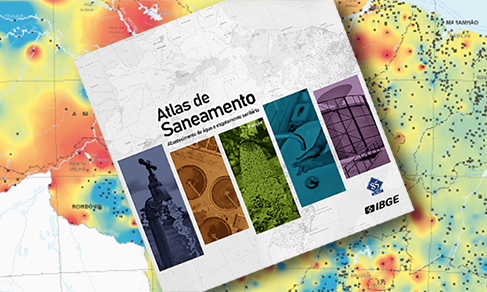Nossos serviços estão apresentando instabilidade no momento. Algumas informações podem não estar disponíveis.
Sanitation Atlas
About the publication - 2004
The release of the Sanitation Atlas by the IBGE is a unique opportunity to unveil, in a direct way, the deep regional inequalities existing in this sector that, even today, makes the universalization and improvement of the services of water supply, sewage, waste collection and urban drainage a target yet to be reached by the State and achieved by the society.
In this context, the Sanitation Atlas provides a privileged reading of the transdisciplinary nature of sanitation, which, in its classic definition, comprises a set of actions aiming at changing the environmental conditions to prevent the diffusion of pathogenic vectors and foster public health and the welfare of the population. As a result, health gains an international definition that considers it complete social, mental and physical welfare and not only the absence of diseases.
The need to approach environmental, health and sanitation problems in a intertwined way and the recognition of the importance of salubrity of the natural environment changed by man are aspects that must be retrieved by a geographic approach of the sanitation subject. It follows that other factors should be approached, like the increase in the density of the urban population, the industrial and agricultural expansion – which brought scarcity and pollution of the water resources –, as well as the natural aspects of hydrography and topography of the terrain, climate and vegetation, among others. The extension of the items surveyed caused the diversification of the sources of information, including not only the IBGE surveys, especially the 2000 Population Census, but also information from other organizations that much contributed to enrich the proposed agenda. The scope acquired by sanitation unveils in the sequence of subjects approached in the 2004 Sanitation Atlas, which was built aiming at approaching different angles to analyze basic sanitation today in Brazil.
More on the product - 2004
Publication
Learn more - 2004
News and Releases
Sanitation atlas spatializes data on the environment and health
Despite the advance in the control of Diseases Related to Poor Environmental Sanitation (DRSAI), they...
24/11/2021
FAQ
What is the Sanitation Atlas?
The Sanitation Atlas provides updated information about sanitation by means of a geographic interpretation of the statistics presented in the National Survey of Basic Sanitation – PNSB. The publication marks the commitment of the Brazilian Institute of Geography and Statistics – IBGE in providing updated information about a key subject of the public health agenda, of sustainability, and of citizenship in the Brazilian society itself. The Sanitation issue, which encompasses a wide range of actions aiming to control environmental conditions and to prevent the diffusion of pathogenic vectors in areas of high population density, requires a multidisciplinary and multiscale approach that can handle the thematic interrelations that have to do with the spatial analysis. This way, the Atlas reinforces the belief that statistical information has its interpretative capacity strengthened, in the complex reality of the contemporary world, when it comes to the territorial approach provided by geography.
What is the National Survey of Basic Sanitation?
The National Survey of Basic Sanitation is mainly intended to investigate the conditions of basic sanitation services in the country, considering municipal governments and companies hired to render this kind of service in the Brazilian municipalities. This investigation, of national coverage, aims not only at the evaluation of the supply and quality of services rendered but also intends to analyze environmental conditions and their direct impact on the Brazilian population’s health and quality of life.
Your question was not answered here?
Please contact us through our service channels.




